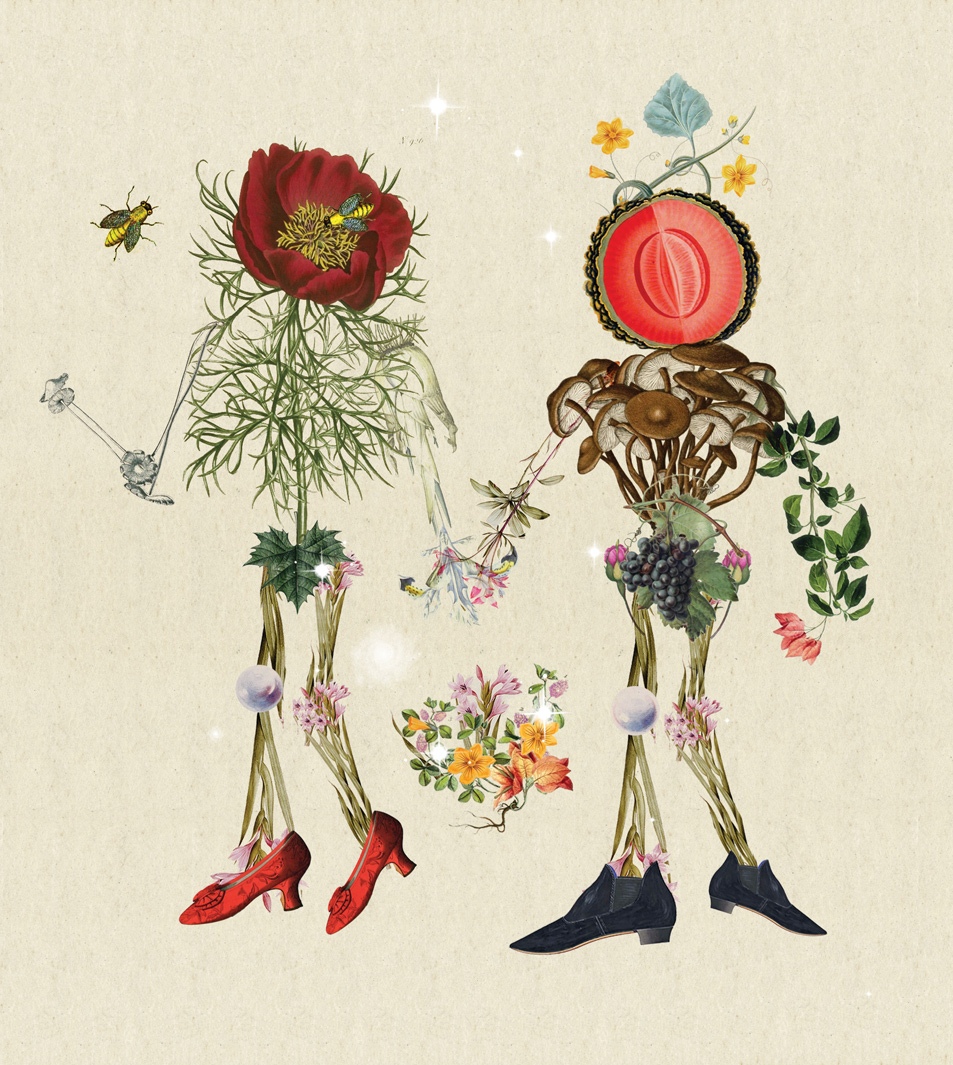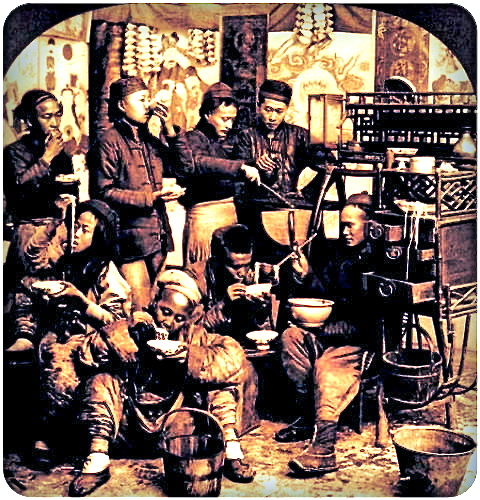
✍️Wendy Brown, Lic. Ac.
Dietary Basics According to
Traditional Chinese Medicine
Turning to traditional Chinese medicine and a Taoist concept of health and long life, one is moderate in every action and attentive to signals of the body and of nature. Eating when hungry and drinking when thirsty, we only ingest enough food and drink to satisfy actual needs that match activity. The dietary realm can be an exotic smorgasbord of delights and unknowns. Diet can also represent rote habit that lacks consideration beyond food cost and convenience. In the balanced view of traditional Chinese diet, neither extreme may be the better one when concerning nourishment. In oriental dietary practice, the overall properties and energetics of foods are always considered – rather than the individual constituents and compounds of nutrients. Foods have a direction they encourage Qi to move in and channels of affinity, as well as seasons and conditions for which they are most suited. The tastes that all foods and medicinals inherently possess is a basis for healing, whether by decoctions of healing herbs or by the preparation of the foods that we use in cooking.  The 5 Food Tastes determine, in large part, therapeutic effects.
The 5 Food Tastes determine, in large part, therapeutic effects.
Principles to be mindful of:
BITTER · Drains and dries; Traveling in the bones.
SWEET · Tonifies, harmonizes, moistens; Traveling in the flesh.
ACRID · Disperses and moves; Traveling in the Qi.
SALTY · Softens and purges; Traveling in the blood.
SOUR · Astringes and draws fluids inward; Traveling in sinews.
BLAND, NEUTRAL · Balancing; Leeching dampness and gently promoting the elimination of fluids through urination.
A basic ‘Middle Burner’ diet of warm, freshly prepared foods might consist of a plentiful variety of fresh, organic vegetables, cooked whole grains, some prepared beans/legumes, and protein from plant-based sources; let’s say, your hens’ eggs and occasional cheese from a neighbor’s goat. The gift of humane sources of certain animal products can be dietarily beneficial in supplementing an otherwise healthy diet. Quality fruits, nuts and seeds are beneficial but it is important to keep these foods in limited proportion to staple foods. Fruit smoothies, which, though they are delicious and are touted as all the rage in many circles, smoothies are unfriendly choices to accentuate the wellbeing of the Stomach’s digestive functioning according to traditional Chinese medical knowledge.
Quality fruits, nuts and seeds are beneficial but it is important to keep these foods in limited proportion to staple foods. Fruit smoothies, which, though they are delicious and are touted as all the rage in many circles, smoothies are unfriendly choices to accentuate the wellbeing of the Stomach’s digestive functioning according to traditional Chinese medical knowledge.
Sugar is poisonous to the bones and alternatives such as rice or barley malt, maple syrup, agave – assuming that agave is better than sugar is questionable for people living in cold or 4-season climate, or honey from your local hives is suitable in small amounts. [Even raw honey is a simple sugar, and I would recommend no commercial grade honey as it has been pasturized and therefore its enzymes have been denatured.]. Oils and fats, too, should be kept at a minimum, fiber at a high, miso and tempe are a ‘yes’, and left-overs are a definite ‘no’. Soups are usually a harmonizing feature of a meal, and a soup starting with a fresh vegetable stock can balance a meal of fried food due to its clarity and neutral thermal nature. Congee, which is a rice porridge, has amazing, nutritive effects on the Spleen and Stomach Qi, which are the roots of ‘Postnatal’ or ‘Acquired’ Qi.
Ginger is a splendid food, beverage, a catalytic heater in the preparation of food dishes, and is a prized medicinal substance. Clinical conditions that can benefit from ginger as a medicinal element are: atherosclerosis, bronchitis, elevated cholesterol, heart disease, blood clots and varicosities and weight loss to name only a few.
 When considering the stomach as a metaphorical soup pot, food in raw material form is catalyzed here to create nourishment by metabolic actions that require as well as produce warmth. It should be considered that the external heat source, as close to the origins of fire, will innately impart warmth to the conversion of food and promote the digestive process. Originally, the way humans cooked their food was over open flame, unequivocally. Over much time and innovation in approaches to cooking, such as current methods of the electric stove top and microwaving, fire has largely been replaced – although never improved upon. More than anything however, cooking fresh foods at home, no matter what the fuel source, is the strongest step toward maintaining good health.
When considering the stomach as a metaphorical soup pot, food in raw material form is catalyzed here to create nourishment by metabolic actions that require as well as produce warmth. It should be considered that the external heat source, as close to the origins of fire, will innately impart warmth to the conversion of food and promote the digestive process. Originally, the way humans cooked their food was over open flame, unequivocally. Over much time and innovation in approaches to cooking, such as current methods of the electric stove top and microwaving, fire has largely been replaced – although never improved upon. More than anything however, cooking fresh foods at home, no matter what the fuel source, is the strongest step toward maintaining good health.

The advice regarding water intake one encounters is to drink only when thirsty or drink a few sips regularly throughout the day and a few sips during a meal. Consuming more than what is essential is considered a defiance of nature and signals of the body. There are obvious cases where higher fluid consumption is important, such as for people who are perspiring profusely due to exercise, hot weather, or resulting from a feverish disease, those who are losing fluids due to diarrhea, as well as one who tends to form kidney stones. By eating the suggested servings of fruit and vegetables per day, plentiful amounts of water are provided; many fruits and vegetables being more than 80% water in content.
Most yin quality foods in a healthy diet contain a significant quantity of water making it feasible to get the 2.5 liters a day without drinking copious amounts of water. However, the popular impression is that for good health one must drink 2.5 liters of water per day, when essentially, emphasis needs to be placed on consuming fresh fruits and vegetables, not on high volume water-intake. Health advisories recommend that sedentary women consume approximately 2,000 calories per day, for which the suggested 1 ml/calorie translates to only 2.0 liters of total water needed. Adding 1.9 liters of water from drinking glass after glass of water simply doubles such suggested intake. Drinking large volumes of water appears to be inconsistent with age-old wisdom inherent in moderation.
Green tea offers many health benefits that are validated by science, however, it is valuable to realize that drinking tea is something unto itself, to be done for its own sake. There is something in the nature of tea that leads us to quiet contemplation. Only in this way can one taste the mysteries of sunlight, wind and clouds, and minerals of the earth. Tea drinking engenders empathy with nature and kinship with one’s fellow beings. As a rule of thumb, white and twig teas are lowest in caffeine and the least drying to the fluids in the body. For people with a fatty constitution or after a greasy meal, pu erh would be the prime tea choice. Drink only organic teas and add no sweeteners.

Photo ©Elemental Changes
Daily supplementation with Chinese herb formulations is a potent catalyst toward a lifestyle of health and balance. Chinese herbal medicine is well-suited for everyday life. Even when healthy, the body as a whole is complimented by food quality and dietary combinations, and also by supplementation with herbal medicines.
Traditional Chinese medicine originally made no reference to pesticides and GMOs. Chemical preservatives and additive compounds have only fairly recently become factors to be recognized. ‘Poisoning,’ however, was described in the ancient Chinese categorizing of pathology. Bu Nei Bu Wai Yin, ‘not inside; not outside,’ differentiates the pathological factors derived of chemical poisoning – which is not to be confused with ‘food poisoning’ derived from wrecked food; food which is impure, spoiled or no longer fresh. All evidence suggests that eating chemically contaminated food is of detriment to long-term heath. This is why it is fully advisable to eat organic food and to use all products that are 100% ethical and free from chemical contamination. Let us be supplemented by food and our way of living, not contaminated by it. I think that eating vegan or ethically sourced vegetarian, even if only periodically, is a necessity, necessarily promoting a lightening on the digestive system rather than undertaking the extreme of depleting ‘cleanse’ regimens. My motto is to leave it off the menu if the source is tainted or is created from suffering or environmental degradation in some way. At this time we all must reconcile that we are each stewards of our health and stewards of this precious natural world.
All evidence suggests that eating chemically contaminated food is of detriment to long-term heath. This is why it is fully advisable to eat organic food and to use all products that are 100% ethical and free from chemical contamination. Let us be supplemented by food and our way of living, not contaminated by it. I think that eating vegan or ethically sourced vegetarian, even if only periodically, is a necessity, necessarily promoting a lightening on the digestive system rather than undertaking the extreme of depleting ‘cleanse’ regimens. My motto is to leave it off the menu if the source is tainted or is created from suffering or environmental degradation in some way. At this time we all must reconcile that we are each stewards of our health and stewards of this precious natural world.
 “The human organism and its nutritional needs have evolved over millions of years. But in the space of fifty years, we have created an entirely new diet which we justify by juggling numbers. In short, we have lost sight of the forest for the trees. Western science has spent so much time myopically examining the minutiae of life that it has lost sight of the broad generalizations which have been tested empirically for hundreds of generations – Age-old wisdom of people living traditionally in consonance with nature and with the laws of human development.” · Bob Flaws
“The human organism and its nutritional needs have evolved over millions of years. But in the space of fifty years, we have created an entirely new diet which we justify by juggling numbers. In short, we have lost sight of the forest for the trees. Western science has spent so much time myopically examining the minutiae of life that it has lost sight of the broad generalizations which have been tested empirically for hundreds of generations – Age-old wisdom of people living traditionally in consonance with nature and with the laws of human development.” · Bob Flaws
Food must address an individual’s health requirements. When eating is for luxury or convenience, diet can be sabotaging. “One who takes medicine and neglects diet wastes the skill of the physician.” ~ Chinese proverb
LET’S TALK.
![]()
Author’s footnote: In my opinion, meat is strictly regarded as medicine and animal by-products used with the highest respect and constervatism. My patient’s are free to eat and live to their calling. I respect everyone’s choices and work with people within the scope of their beliefs and the parameters of Chinese medicine.
Elemental Changes Oriental Medical Arts
Wendy Brown, Lic. Ac.
(828)281-4330